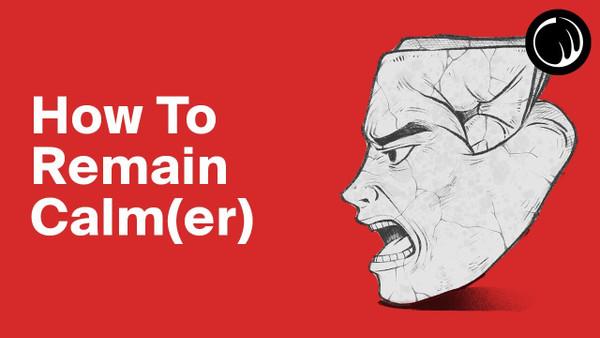How To Remain Calm(er) With People - Psychology & Stoic Philosophy
Curated from: Pursuit of Wonder
Ideas, facts & insights covering these topics:
6 ideas
·2.93K reads
34
1
Explore the World's Best Ideas
Join today and uncover 100+ curated journeys from 50+ topics. Unlock access to our mobile app with extensive features.
The good and bad of anger
We live in a culture that likes idealism. We notice so much wrong with others, ourselves, the way things are. Little things such as the sound of a car horn or a lost set of keys remind us that idealism is impossible.
Often, anger makes a lot of sense. Certain types of anger can be very useful as a source of insight when we've been wronged, when things are going poorly, when we want change. However, anger can also be a source of foolishness, miscalculation, regret, resentment, and detachment.
56
762 reads
Becoming hardened is unhelpful
We can be wronged in unjust ways, such as being targeted, and in these cases, anger can be used to motivate us to stand up and defend ourselves.
But, more often we are wronged in a way where anger will not help to correct or solve it. When we try to resist and reject any sort of softer acceptance and sadness in response to this, we can become hardened with a sort of brute and frequent anger and become numb and unfeeling.
52
530 reads
Appraisal theory
Psychologist Magda Arnold developed the appraisal theory. It states that our emotional responses are mostly created by our conscious evaluations of events - how we view, interpret, and label stimuli.
For example, if we believe cats are sweet and harmless, holding a particular cat will be a favourable emotional experience. But someone who believes cats threatening or devious, will likely have a negative experience. The responses are very different to the same stimulus.
55
447 reads
Practical use of the appraisal theory
When we are angered frequently or remain angered for long periods, there is an opportunity to switch our mental filter in favour of better, more productive experiences.
For the stoics, events in the world are objective and neutral. Our emotional experiences are the product of the stories we tell ourselves. It can't hurt you unless you interpret what's happening as harmful. If we realise that the world has not singled us out, most people are trying their best, that ignorance is more often the reason than malice, we can realise that the situation is not worthy of being angry about.
58
413 reads
Learning how to think really means learning how to exercise some control over how and what you think. It means being conscious and aware enough to choose what you pay attention to and to choose how you construct meaning from experience. Because if you cannot or will not exercise this kind of choice in ... life, you will be totally hosed.
DAVID FOSTER WALLACE
51
405 reads
Controlling unhelpful anger
We should not live an agreeable life in which our anger is always denied of its expression. But when anger comes from a place that isn't angry about the thing we seem to be angry about, the anger is a liability, not an asset.
We should not think that we have personally been made victim by the world. When we are angry, all of this sounds nonsensical or impossible, but it is then that these ideas matter so much.
54
381 reads
IDEAS CURATED BY
Laila M.'s ideas are part of this journey:
Learn more about loveandrelationships with this collection
How to strengthen your willpower
How to overcome temptation and distractions
The role of motivation in willpower
Related collections
Similar ideas
18 ideas
How People Think
collaborativefund.com
Read & Learn
20x Faster
without
deepstash
with
deepstash
with
deepstash
Personalized microlearning
—
100+ Learning Journeys
—
Access to 200,000+ ideas
—
Access to the mobile app
—
Unlimited idea saving
—
—
Unlimited history
—
—
Unlimited listening to ideas
—
—
Downloading & offline access
—
—
Supercharge your mind with one idea per day
Enter your email and spend 1 minute every day to learn something new.
I agree to receive email updates



